Five Years Since the Violent Tidemill Eviction, Its Ghosts Still Haunt Peabody’s New ‘Frankham Walk’ Development

Please support my work as a reader-funded investigative journalist, commentator and activist. If you can help, please click on the button below to donate via PayPal.
Five years ago today, on October 29, 2018, the brave two-month occupation of the Old Tidemill Wildlife Garden, a community garden in Deptford, came to a violent end when bailiffs hired by Lewisham Council, from the union-busting company County Enforcement, raided the garden at dawn, evicting the handful of campaigners staying there overnight in what they subsequently characterised as a terrifying quasi-military operation.
The bailiffs subsequently began tearing down trees, including the garden’s prized Indian bean trees, and demolishing all of the structures that had contributed to its community focus — the colourful tree house by the bean trees, which had entertained children throughout the garden’s 25-year history, and a number of sheds that had, most recently, been used as exhibition spaces.
Throughout the rest of the day, there was a tense stand-off between campaigners and hundreds of local people who had turned up to offer support, and the bailiffs, protected by a row of police. As campaigners conducted interviews with a number of broadcasters, including the BBC, and campaigners railed against the bailiffs and the police via a loudhailer, occasional skirmishes broke out, in which a number of people were injured, but by the end of the day the garden was ‘secured.’
‘Frankham Walk’: Peabody’s Cynical Rebranding of the Destroyed Old Tidemill Garden Site in Deptford

Please support my work as a reader-funded investigative journalist, commentator and activist. If you can help, please click on the button below to donate via PayPal.
So finally, Peabody, the charitable housing association turned private developer, has rebranded the destroyed Old Tidemill Wildlife Garden site in Deptford, and the ‘regenerated’ old Tidemill primary school next door, as ‘Frankham Walk’, featuring, as its advertising hoardings show, “Your dream home” — if your dream home consists of a 1, 2, 3 or 4-bedroom apartment, a duplex or a townhouse for private sale or shared ownership, with private sales for 1 to 3-bedroom flats ranging in price from £337,500 to £690,000, and with shared ownership deals ranging from £84,375 to £172,500 for a 25% share, plus monthly rent and service charges.
There are, or will be 144 properties in total in ’Frankham Walk’ — 51 for private sale, 14 for shared ownership, and 79 that, we are told, will be “affordable rent homes for local people on Lewisham Council’s waiting list.” A further 65 properties — 27 for shared ownership, and 38 “affordable rent homes for local people on Lewisham Council’s waiting list” — will, we are also told, follow when 2-30a Reginald Road, an existing block of 16 structurally sound council flats, is demolished and replaced with new housing.

The name ‘Frankham Walk’ was probably arrived at after the longest deliberations in the history of 21st century ‘regeneration’ projects, because of the contentious nature of the development, which involved the two-month occupation of the garden by campaigners, to try to prevent its destruction, its violent eviction by bailiffs hired by Lewisham Council, and millions of pounds spent by the council guarding the empty school and the destroyed garden.
Photos of the Two-Month Occupation of the Old Tidemill Wildlife Garden Prior to its Violent Eviction

Please support my work as a reader-funded investigative journalist, commentator and activist. If you can help, please click on the button below to donate via PayPal.
One year ago yesterday, the two-month occupation of the Old Tidemill Wildlife Garden, a community garden in Deptford, in south east London, came to a violent end when bailiffs hired by Lewisham Council evicted the occupiers in a dawn raid.
It was a disturbing end to a long-running effort on the part of the local community to save the garden — and Reginald House, a block of structurally sound council flats next door — from destruction as part of a plan to re-develop the site of the old Tidemill primary school. The garden — a magical design of concentric circles — had been created by pupils, teachers and parents 20 years before, and the community had been given use of it after the school moved to a new site in 2012, while efforts to finalise the plans proceeded, with the housing association Family Mosaic (which later merged with Peabody) and the private developer Sherrygreen Homes.
The garden was not only a magical green space; it also helped to mitigate the worst effects of pollution on nearby Deptford Church Street, but the council weren’t interested in considering alternative plans that would have spared the garden and Reginald House, and terminated the lease on the garden on August 28 last year. However, instead of giving the keys back, the community occupied the garden instead, embarking on a two-month experiment in community resistance that resonated around the world.
One Year Since the Tidemill Occupation Began, Is the Tide Turning Against the ‘Regeneration’ Industry?

Please support my work as a reader-funded investigative journalist, commentator and activist. If you can help, please click on the button below to donate via PayPal.
One year ago, local residents and activists in Deptford, in south east London — myself included — occupied a community garden, the Old Tidemill Wildlife Garden, to try to prevent its destruction by Lewisham Council for a housing project. Strenuous efforts had been made by members of the local community for many years to persuade the council that their plans for the garden — originally part of the Tidemill primary school, which moved out of its premises in 2012 — were environmentally deranged, because the garden miligated the worst effects of the horrendous pollution on nearby Deptford Church Street, but they had refused to listen.
The plans involved not just the garden — a magical space created by pupils, parents and teachers 20 years before — but also Reginald House, a block of 16 structurally sound flats next door, which, cynically, were to be destroyed to make way for the new development, and the old school itself. Campaigners had no fundamental objections to the former school buildings being converted into housing, but the plans for the garden and for Reginald House were so profoundly unacceptable that, when the council approved the development in September 2017, campaigners began to hatch plans for the occupation.
The garden had been kept open by guardians who had been installed in the old school buildings after it closed in 2012, and when that contract was terminated, the local community were given “meanwhile use” of the garden instead. A handful of volunteers had opened it at weekends, but as time went on the numbers of people drawn to it increased, and after Lewisham Council made its decision, ironically, interest in the garden mushroomed. Numerous musical and artistic events took place throughout spring and summer 2018, and when the council called for campaigners to hand the keys back on August 29, the long-mooted plan to occupy the garden instead went into effect.
Lewisham Council Still Mired in Controversy Six Months After the Violent Eviction of the Old Tidemill Wildlife Garden in Deptford
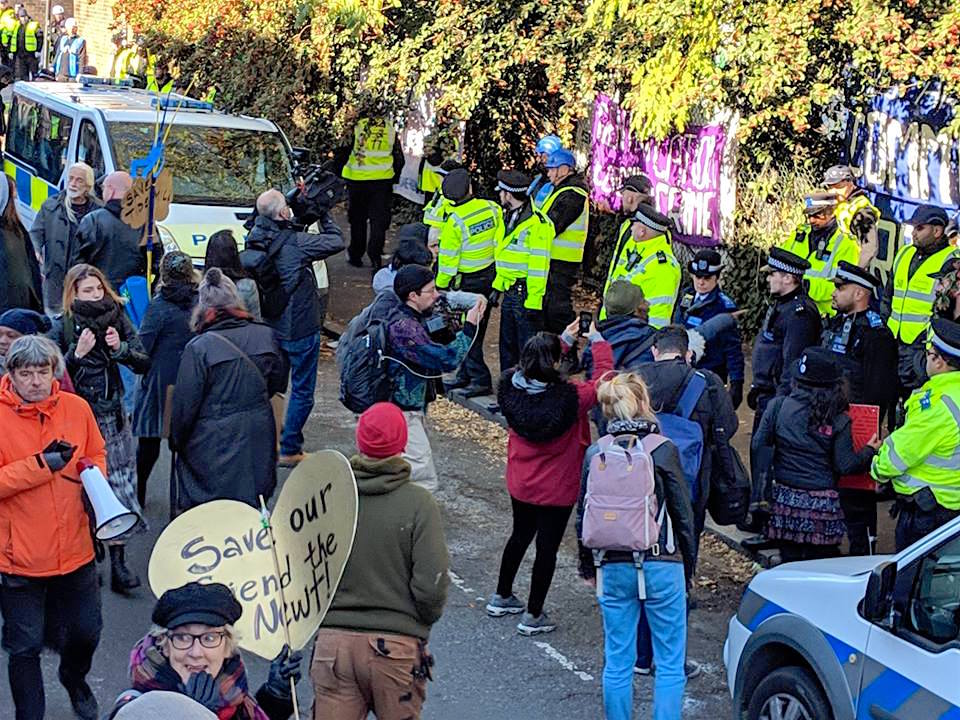
Please support my work as a reader-funded investigative journalist, commentator and activist. If you can help, please click on the button below to donate via PayPal.
Exactly six months ago, the Old Tidemill Wildlife Garden in Deptford, a beautiful community space and environmental asset, which had been occupied for two months by members of the local community (the Save Reginald Save Tidemill campaign) to prevent its destruction by Lewisham Council for a housing scheme, was violently evicted by bailiffs working for the notoriously aggressive — and, historically, union-busting — company County Enforcement.
The garden was part of the old Tidemill primary school, which closed in 2012 and moved to a new site nearby, and the council’s plans are to hand over the site to the housing association Peabody to build new housing for sale on the old school site, and housing for rent or shared ownership where the garden stood, and where Reginald House, a block of 16 council flats, still stands.
The garden, sadly, was completely destroyed two months ago, by SDL Services, a tree services company from Gloucestershire — in the same week that the council, with no sense of shame or irony, declared a climate emergency! — but building work has still not begun, and campaigners are still calling for the scheme to be scrapped, and for a new plan to be created with the local community, which reinstates the garden and saves Reginald House.
Video: The Peaceful Occupation and Violent Eviction of the Old Tidemill Wildlife Garden in Deptford
Please support my work as a reader-funded investigative journalist, commentator and activist.
Today marks six days since the violent eviction of the Old Tidemill Wildlife Garden in Deptford, which campaigners, myself included, had been occupying for two months to prevent its destruction by Lewisham Council for a housing development — one that could be built elsewhere in the borough if the will existed to do so.
Throughout the occupation, and for many years before it, we have endlessly tried to impress on the council that it is unacceptable to destroy the garden, a vital community green space, and a hugely significant environmental asset, which mitigates the worst effects of pollution on nearby Deptford Church Street, which regularly reaches six times the World Health Organisation’s recommended safety levels, and that it is also unacceptable to destroy Reginald House, a block of 16 structurally sound council flats next door. The council, however, has never shown any interest whatsoever in engaging with us or in listening to our demands for them to go back to the drawing board, and to come up with new plans that spare the garden and the flats.
Unusually, I haven’t published anything here on my website for five days, since I posted my immediate impressions of the eviction the day after, in an article entitled, The Violent Eviction of the Old Tidemill Wildlife Garden: Lewisham Councillors Make Sure They Will Never Be Welcome in Deptford Again.
It’s fair to say, I believe, that myself and other campaigners have been struggling to cope with the fallout from Monday’s violence. We have no intentions of giving up, of course, but we’ve all been emotionally drained, so as I continue to recover I’m posting below, via YouTube, a 12-minute film of the occupation and the eviction made by the Peckham-based Rainbow Collective, which, at the time of writing, has had nearly 4,000 views on Facebook. Read the rest of this entry »
The Full Horror of the Tideway Super-Sewer Excavations at Deptford Creek and the Clear Need for All Housing Developments, Including Tidemill, to be Stopped
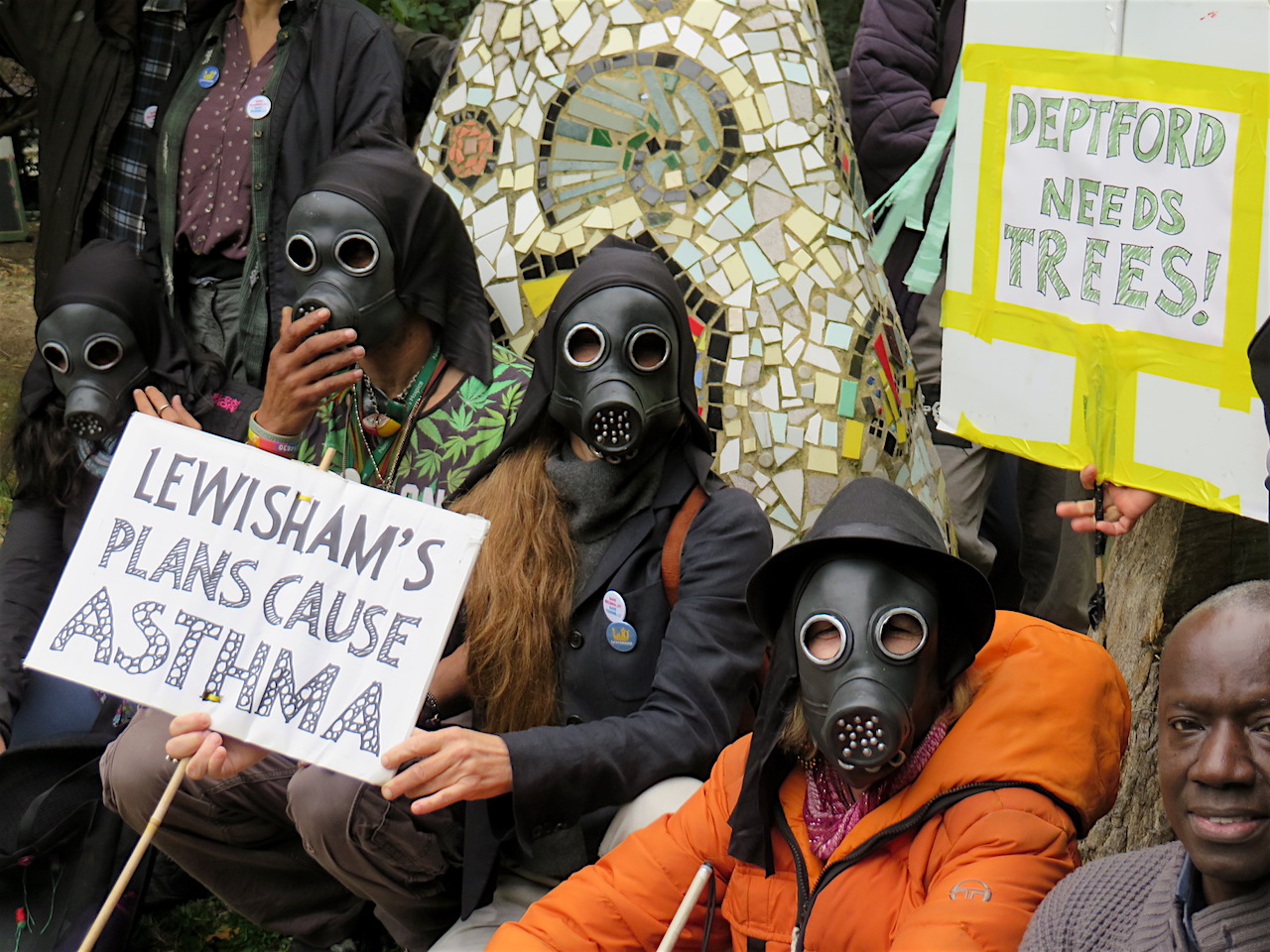 Please support my work as a reader-funded investigative journalist, commentator and activist.
Please support my work as a reader-funded investigative journalist, commentator and activist.
In Deptford, in south east London, the Save Reginald Save Tidemill campaign that I’m part of is involved in a significant struggle against three aspects of the current housing crisis that are a microcosm of what is happening elsewhere in the capital and across the country, and that cry out for concerted resistance.
The first is the destruction of precious green space for a housing project that could easily be built elsewhere. The second is the destruction of structurally sound council housing, as part of the proposed development, that has no purpose except to do away with genuine social housing, and to replace it with a new form of allegedly affordable social housing that, in fact, is considerably more expensive and offers fewer protections for tenants. The third involves issues of pollution and environmental degradation that are already at crisis pint, and that will only get considerably worse if councils’ and developers’ mania for ‘regeneration’ continues unchecked.
On this third point, the work of campaigners — who have been occupying the Old Tidemill Wildlife Garden since August 29, to prevent its destruction — has successfully enabled large numbers of people to understand that the garden (created 20 years ago as a beautiful landscaped garden for the local primary school, and leased to representatives on the local community for the last six years, since the school closed and moved to a new site) is an important bulwark against the horrendous pollution on the nearby A2 and also on Deptford Church Street, a dual carriageway that is one of two main routes to Greenwich and that also provides access to the Rotherhithe Tunnel. Read the rest of this entry »
A Radical Proposal to Save the Old Tidemill Garden and Reginald House in Deptford: Use Besson Street, an Empty Site in New Cross
 In Deptford, in south east London, a battle is taking place. On one side are Lewisham Council and the developer Peabody, who intend to destroy the Old Tidemill Wildlife Garden, a garden that has been used by local children and the wider community for 20 years, and Reginald House, a block of structurally sound council flats next door, for a new housing project centred on the old Tidemill primary school.
In Deptford, in south east London, a battle is taking place. On one side are Lewisham Council and the developer Peabody, who intend to destroy the Old Tidemill Wildlife Garden, a garden that has been used by local children and the wider community for 20 years, and Reginald House, a block of structurally sound council flats next door, for a new housing project centred on the old Tidemill primary school.
Opposing the council and Peabody — in the manner of that little Gaulish village that held out against Julius Caesar in ‘Asterix the Gaul’ — are representatives of the local community, who have occupied the garden since August 29 to prevent it being boarded up prior to its intended destruction, and also to prevent the demolition of Reginald House, whose tenants are also involved in the campaign.
The Tidemill campaign has, very noticeably, the moral high ground, while the council and Peabody have nothing but spin and deception. The garden is a magical green space and community asset that is also of notable environmental significance, mitigating the horrendous effects of pollution on the traffic-choked roads nearby, and is therefore genuinely priceless. As for Reginald House next door, there can be no rational justification for knocking down structurally sound social housing to build new properties that are also described as “homes for social rent”, unless some subterfuge is involved. Read the rest of this entry »
‘No Social Cleansing in London’: Campaign Launch and Fundraising Gig for the Tidemill Campaign in Deptford at the DIY Space in Peckham, Fri. Oct. 12
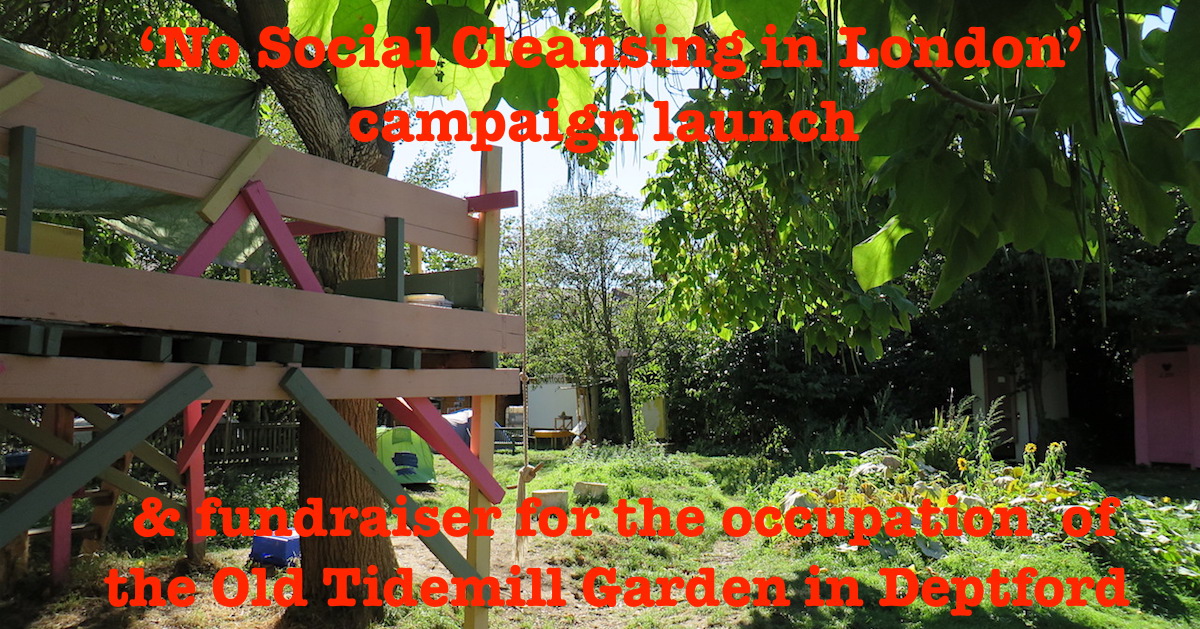 Please support my work as a reader-funded investigative journalist, commentator and activist.
Please support my work as a reader-funded investigative journalist, commentator and activist.
If you’re in London and concerned about the unprecedented scale of London’s housing crisis, I hope you’ll come along this Friday to the launch of ‘No Social Cleansing in London’, a new campaign group that I’m setting up to provide a focal point for struggles against the destruction of social housing, via “regeneration” projects, involving the destruction of council estates, that are designed to socially cleanse poorer residents, and to provide largely unscrutinised profits for builders and developers, and an unfettered private rental market that, for the first time in London’s modern history, is pricing all manner of people out of the capital.
The launch is taking place at the DIY Space for London, a volunteer-run social space at 96-108 Ormside Street, Peckham London SE15 1TF, on an industrial estate just off Ildeston Road, and close to the Old Kent Road, where evangelical churches, traditional industries and young creative types cluster in the shadow of the monstrous Old Kent Road re-development plans of Southwark Council, whose mania for unwanted and unnecessary high-rise housing developments betrays a complete lack of understanding about the nature of employment in 21st century London, and the tens of thousands of workers who can only survive in their businesses on an around the Old Kent Road because they are not exposed to the full greed of the corporate market.
Friday’s event is intended to, in the first instance, provide an opportunity for housing campaigners to come together from across London’s 32 boroughs to meet and mingle and to come up with strategies of resistance. In the weeks to come, I’ll be setting up Facebook and Twitter pages for the campaign — and, hopefully, a website — so if anyone wants to be involved, please do get in touch. Read the rest of this entry »
Shame on Peabody: Calling on the Former Philanthropic Social Housing Provider to Abandon Its Plans to Destroy the Old Tidemill Garden and Social Housing in Deptford
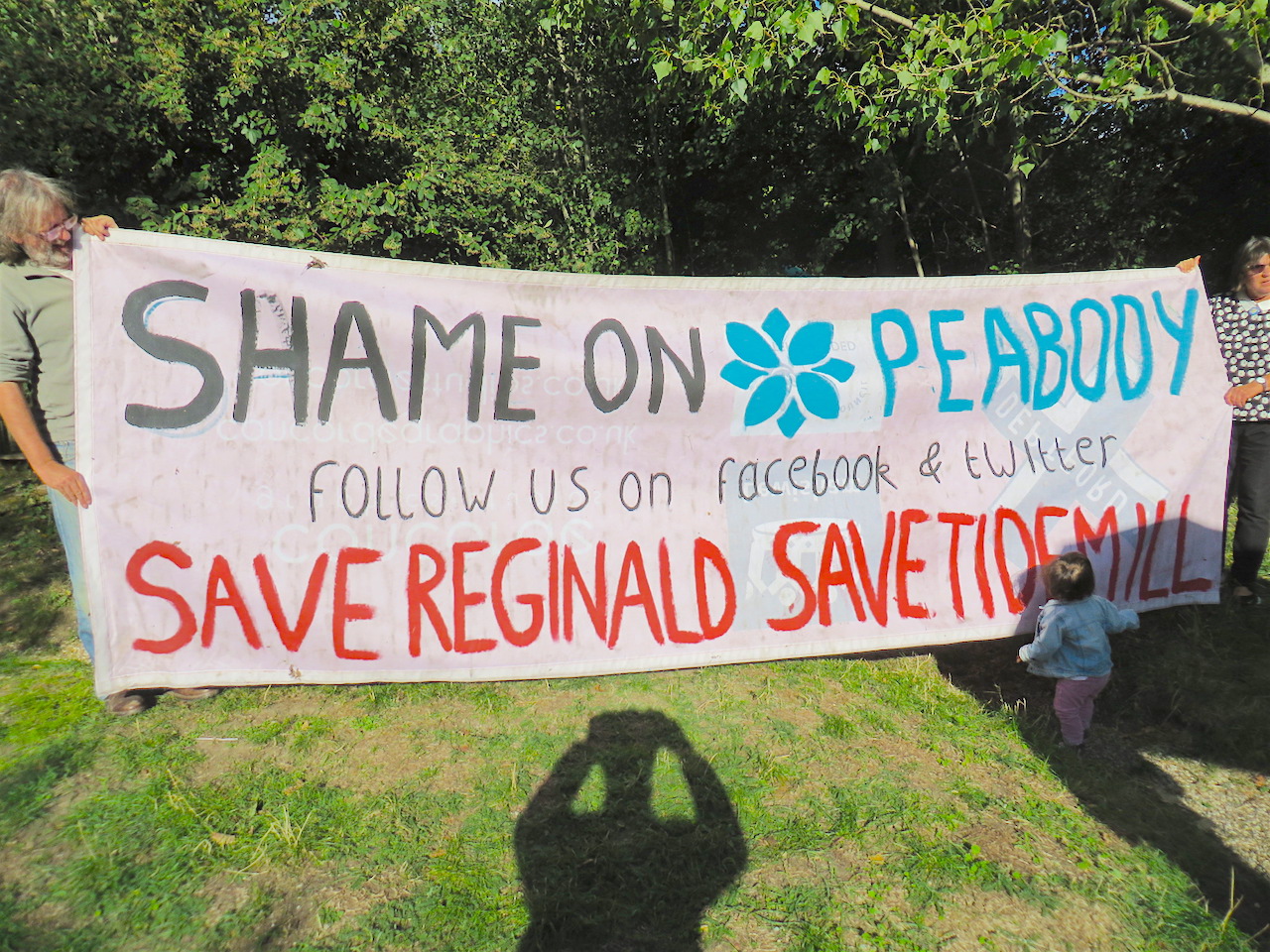 Since the occupation of the Old Tidemill Wildlife Garden in Deptford began, on August 29th, we’ve been so busy focusing on Lewisham Council’s shameful role as the would-be destroyers of a crucially important environmental and community green space, and the wilful destruction of 16 structurally sound council flats next door, in Reginald House, for a new housing development, that we’ve failed to shine a light on their development partners, Peabody.
Since the occupation of the Old Tidemill Wildlife Garden in Deptford began, on August 29th, we’ve been so busy focusing on Lewisham Council’s shameful role as the would-be destroyers of a crucially important environmental and community green space, and the wilful destruction of 16 structurally sound council flats next door, in Reginald House, for a new housing development, that we’ve failed to shine a light on their development partners, Peabody.
This is unfair, because, although Lewisham Council owns the land, Peabody are fully implicated in the plans to destroy the garden and almost all of the 74 trees in the garden and on the wider development site, and to demolish the 16 flats of Reginald House and to replace them with a new form of social housing that is not the same as what they’re proposing to destroy.
Of the 16 flats in Reginald House, three are leasehold, meaning that tenants bought them via the ‘Right to Buy’ introduced by Margaret Thatcher, while the other 13 are council flats let at social rents, which in Lewisham, are, on average, £95.54 for a two-bedroom flat. In the proposals for the site, these homes will be replaced with new flats that will be let at ‘London Affordable Rent’, initiated by London’s Mayor Sadiq Khan, which, in Lewisham, are 63% higher at £152.73 a week. That difference, of course, is huge for lower-earning families who are already struggling to make ends meet, and yet the shift to ‘London Affordable Rent’ is fully endorsed by the council and Peabody, leading to the unerring conclusion that both organisations are actually committed to destroying the entire system of social rents, and establishing ‘London Affordable Rent’ as the lowest rents that will be available in future. Read the rest of this entry »
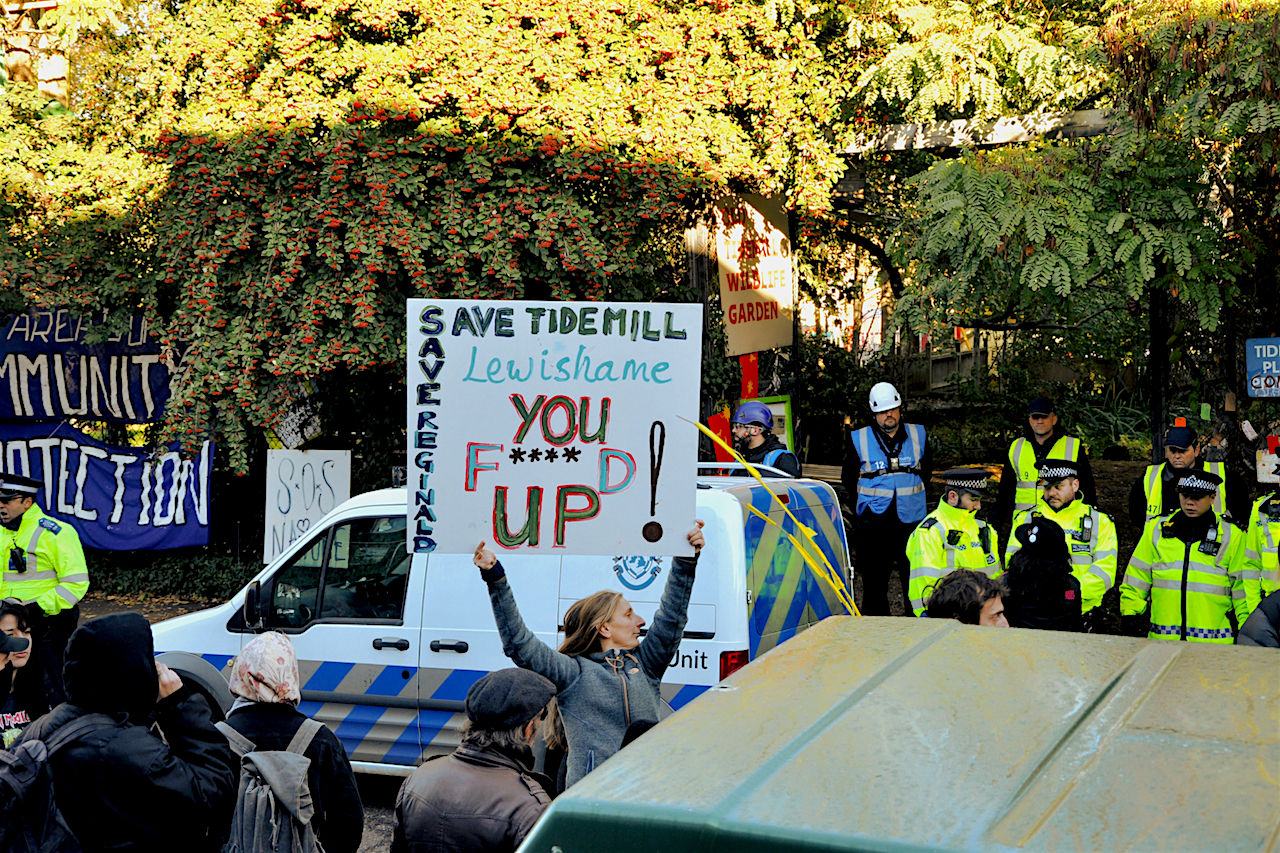












 Who's still at Guantánamo?
Who's still at Guantánamo?
